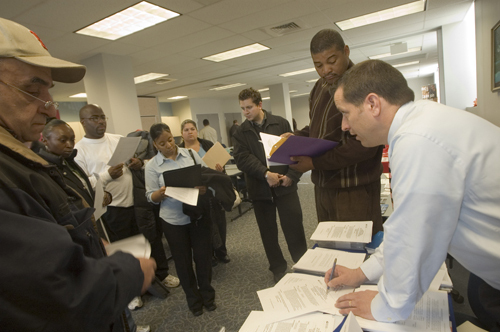
In Iraq, 25-year-old Peter Santos handled supply logistics for the Marine Corps, a critical job in a time of war. “I made sure people got their three Bs – beans, bullets and Band-Aids,” Santos explained last week.
But now the Fall River resident, who left the military in 2005, is jobless.
He said he has held jobs as a security guard and a police officer since his discharge, but he quickly realized that career path wasn’t for him.
So last week, he attended a job fair for veterans at the R.I. Department of Labor and Training’s netWORKri center in Providence, looking for work related to his experience in the Marines. “I haven’t had many bites in logistics,” Santos said of his job search. “It’s always back to security.”
Despite Santos’ job-hunting experiences, state and federal officials report that, for the most part, soldiers and sailors returning from deployment in Iraq and elsewhere haven’t had much difficulty re-entering the work force.
In the late 1960s and the 1970s, many Vietnam-era veterans struggled when they came back stateside as they dealt with physical and psychological wounds from combat and endured indifference from the government, the business world and the public.
It’s been different this time, officials say.
A much larger portion of the fighting force overseas is made up of National Guardsmen and reservists who most often return to the jobs they held before their deployment, according to Stephen Durst, director of the U.S. Department of Labor in Rhode Island. By law, their jobs are protected during their deployment for up to five years.
“Those guys are coming back, and they’re going right back to work,” Durst said.
In fact, at a “demobilization” briefing last month for a R.I. National Guard military police unit returning from Iraq, only a few of the 130 Guardsmen didn’t have a job lined up when they arrived home. Most were police officers and prison guards.
There’s a difference among the regular active-duty troops, too. A higher number of them are electing to stay in the military, an apparent result of the government’s efforts to retain troops, one military official said.
In turn, fewer soldiers are entering the civilian work force, according to Walter Shaughnessy, a transition specialist at the naval base in Newport.
Shaughnessy said the number of discharging soldiers and sailors attending his four-day job-hunting seminar has dropped in recent years from 120 every other month to about 60.
“They were downsizing the military, so there were a lot of people getting out,” Shaughnessy said last week. “Now we see a lot more people staying in, interestingly enough.”
Another difference: Learning from the Vietnam experience, the federal government has established employment assistance programs for older vets as well as those who have recently returned from deployment.
As a result, state employment figures show that the unemployment rate among all veterans in Rhode Island – about 43,000 who are able to work – is running at 3.1 percent, lower than the overall unemployment rate in Rhode Island of 4.7 percent.
The rate is higher for younger veterans such as Santos.
For those veterans who don’t have a job, or those who are looking to start a new career, there’s a lot of help available, according to state and federal labor officials.
Last week, netWORKri hosted two job fairs for veterans organized by Raymond Christiansen, a disabled veterans outreach specialist at the DLT.
There are also the Local Veterans Employment Representatives program and the Disabled Veterans Outreach Program, both operated through the DLT.
And Shaughnessy’s Transition Assistance Program, run through the Department of Defense, offers résumé writing help, mock interviews and tips on negotiating job offers.
Soldiers disabled in combat also can receive job training from the Department of Veterans Affairs, officials said, particularly if the injury prevents a veteran from performing his or her former job.
“If they’re so disabled that they can’t do their old job, then they’ll be retrained into a new position that they’re medically able to do,” Durst said.
While Shaughnessy said there is a high incidence of post-traumatic stress disorder among returning soldiers, he hasn’t heard of veterans having difficulty getting jobs because of it or other disabilities. “Nowadays, it’s recognized quicker, and it’s being treated almost immediately,” he said.
Joseph DesRoches, chief of work force development, employment and training at the DLT, said all returning Guardsmen are required to attend the “demobilization” briefings when they return home.
That’s where they are informed of their medical and employment rights, and they must check in with the DLT or the U.S. Department of Labor. Those who say they are jobless are paired with a local veteran employment representative, who can arrange unemployment benefits, training or job interviews.
And the programs aren’t just for veterans who left the military recently.
Discharged from the Marines in 1996 because of asthma, Mark Brelsford, 48, of Providence had been unhappy working as a field manager for a security company.
But under the Disabled Veterans Outreach Program, established in 1977, he received training earlier this yearas a computer numerical control (CNC) operator and now works as a machinist at KMC Inc., a West Greenwich bearings manufacturer.
“It’s a great job,” Brelsford said last week. “In the Marine Corps, I was a machinist – I guess you could say it was my first love.”
At the job fairs last week, many of the attendees were either older veterans or people who were never in the military.
That’s why Santos, who is married and expecting his first child soon, attracted attention at the U.S. Department of Veterans Affairs table, which was looking for future veterans service representatives – a job that needs to be filled by former soldiers.
“That would be something I’d like to do,” Santos said afterward: “helping out other veterans.” •












